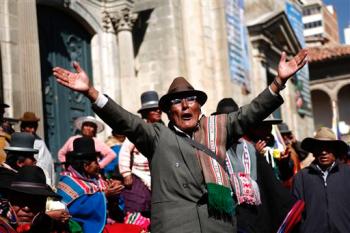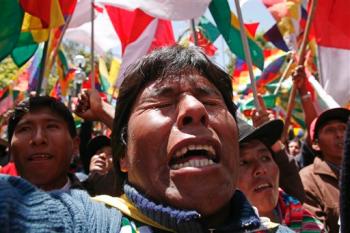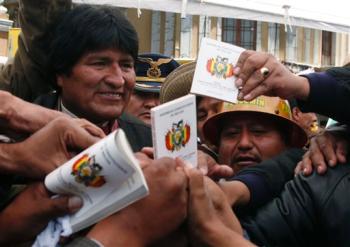Bolivia's president celebrates constitution win
October 20, 2008 - Associated Press
By DAN KEANE
LA PAZ, Bolivia (AP) -- President Evo Morales said he can "go to the cemetery happy" Tuesday after Congress approved holding a referendum on his new constitution empowering Bolivia's long-oppressed Indian majority.
 (left) A supporter of Bolivia's President Evo Morales shouts slogans outside the Congress in La Paz, Bolivia, Tuesday, Oct. 21, 2008. Morales agreed on Monday to seek only one more five-year term, a key concession that all but ended a standoff in Congress over a new constitution to empower Bolivia's long-oppressed indigenous majority. Morales also announced that a constitutional referendum will be held Jan. 25. (AP Photo/Dado Galdieri)
(left) A supporter of Bolivia's President Evo Morales shouts slogans outside the Congress in La Paz, Bolivia, Tuesday, Oct. 21, 2008. Morales agreed on Monday to seek only one more five-year term, a key concession that all but ended a standoff in Congress over a new constitution to empower Bolivia's long-oppressed indigenous majority. Morales also announced that a constitutional referendum will be held Jan. 25. (AP Photo/Dado Galdieri)
Bolivia's first indigenous president wiped away tears as he waded into a crowd of tens of thousands of delirious supporters who had packed the capital's narrow streets to demand lawmakers pass the proposed charter, which now goes before voters on Jan. 25.
"Now we have made history," Morales told miners, farmers, and oil workers from across the country who packed La Paz's central plaza, where Indians were forbidden to set foot until the 1950s. "Honestly, I could go to the cemetery happy because now I have fulfilled my commitment to the Bolivian people."
Morales, elected in 2005, has dedicated his administration to installing a new constitution drawn from Bolivia's traditional indigenous values and expanding the state's role in the economy.
But his campaign has met fierce resistance from the more mixed-race, middle and upper classes in Bolivia's lowland east, who view the new framework as a Morales power grab that ignores their demands for greater provincial autonomy.
 (right) A supporter of Bolivia's President Evo Morales reacts outside the Congress in La Paz, Tuesday, Oct. 21, 2008. Congress ratified President Morales' draft constitution on Tuesday and sent it to a nationwide vote on Jan. 25, 2009, granting the leftist leader a hard-fought victory in his push to remake South America's poorest country.(AP Photo/Dado Galdieri)
(right) A supporter of Bolivia's President Evo Morales reacts outside the Congress in La Paz, Tuesday, Oct. 21, 2008. Congress ratified President Morales' draft constitution on Tuesday and sent it to a nationwide vote on Jan. 25, 2009, granting the leftist leader a hard-fought victory in his push to remake South America's poorest country.(AP Photo/Dado Galdieri)
Lawmakers tried to address those concerns with a long list of 11th-hour edits to the draft that significantly expand provincial governments' powers while curbing several of Morales' ambitious reforms.
"This is not the constitution we would have wanted," said Jorge Quiroga, leader of the conservative opposition party Podemos, which has long resisted Morales' constitution. "But we're the opposition, and it's the best we can do from here."
The constitution is expected to easily pass January's vote, buoyed by Morales' popularity and polls showing voters wanting an end to more than two years of political grandstanding, failed negotiations and street riots over its 411 articles.
Constitutional talks had all but stalled until Morales on Monday agreed to seek only one more five-year term in exchange for opposition lawmakers' support of the document.
 (left) Bolivia's President Evo Morales, left, greets supporters outside the presidential palace in La Paz, Bolivia, Tuesday, Oct. 21, 2008. Congress ratified President Morales' draft constitution on Tuesday and sent it to a nationwide vote on Jan. 25, 2009, granting the leftist leader a hard-fought victory in his push to remake South America's poorest country.(AP Photo/Dado Galdieri)
(left) Bolivia's President Evo Morales, left, greets supporters outside the presidential palace in La Paz, Bolivia, Tuesday, Oct. 21, 2008. Congress ratified President Morales' draft constitution on Tuesday and sent it to a nationwide vote on Jan. 25, 2009, granting the leftist leader a hard-fought victory in his push to remake South America's poorest country.(AP Photo/Dado Galdieri)
The president said the trade-off was worth delivering the legal recognition demanded by Bolivia's indigenous peoples years before he came to power.
Besides, he said, "new leaders coming up like mushrooms" from the country's lower classes would take his place.
Last month, anti-Morales rioters seized government offices across the east in a bid to halt constitution talks. But the protests failed to win wider support, and a weakened conservative opposition eventually returned to the negotiating table.
Despite the edits, the charter's chief goals remained intact, including a lengthy bill of rights with a chapter dedicated to indigenous peoples.
But it was not immediately clear how articles granting them autonomy over their traditional lands and a "priority" share of the country's natural resources wealth would square with greater self-rule granted to overlapping provinces controlled by the opposition.
"This baby isn't perfect, as many have said," said Alejandro Colanzi, congressman from the centrist opposition party National Unity. "But it's our baby, and we can't deny it. Maybe life, as it unfolds, will perfect it."